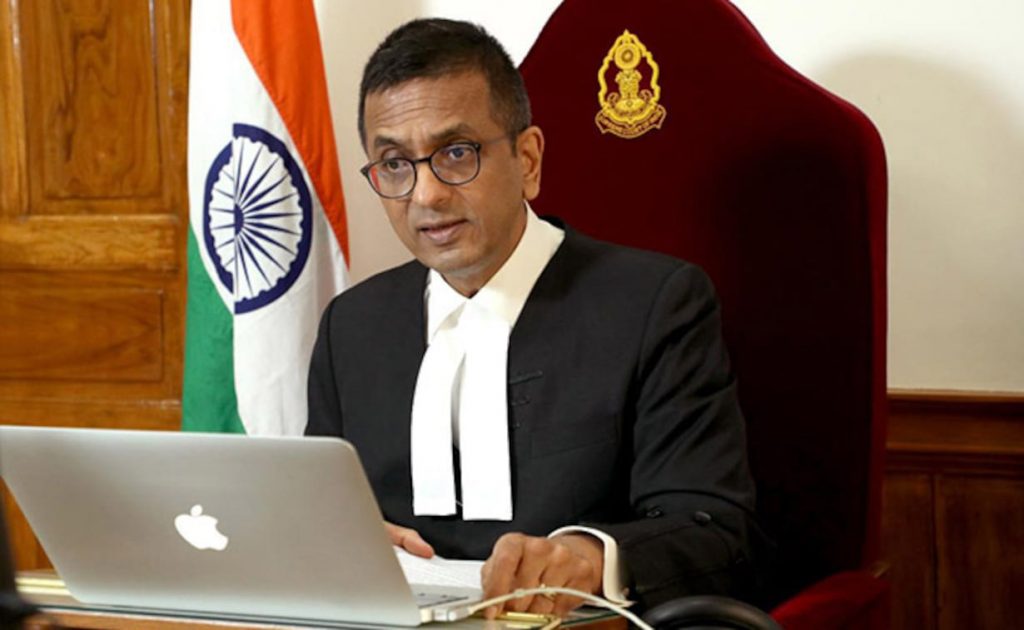
Recently, CJI DY Chandrachud expressed concern over the issue when he said that the Supreme Court must not become a ‘tareekh pe tareekh’ court. However, such sermons would be meaningless unless supported by effective judicial pronouncements to thwart such practices. A report by Mudit Mathur
The deliberate use of delaying tactics, endlessly prolonging court hearings, is gradually eroding people’s faith in the Indian judicial system. This pervasive malaise is the consequence of unethical and well-planned strategic practices that have transcended the boundaries of the lower judiciary. Even the constitutional jurisdictions of the High Courts and the Supreme Court have fallen prey to these unscrupulous tactics, resulting in a massive backlog of old cases.
The preamble of the Indian Constitution solemnly commits to justice—social, economic, and political—placing it on the highest pedestal above all other basic structures. The delay of justice is not simply the deferment of an action over some time; in its judicial context, it is an action in a process that has irreversible long-term consequences. Thus, the evils of adjournment culture gradually, surreptitiously, and silently erode the fundamental right to speedy justice.”
The right to a hearing within a reasonable time is also recognized in the Universal Declaration of Human Rights of 1948. Therefore, due to all these efforts, the right to justice within the stipulated time is accepted as a universal human right and occupies the centre stage of the national and judicial goals of all civilized democracies.
The national scenario of pending cases is alarmingly high and unmanageable with poor infrastructure and presently available strength of judges. According to available data, as many as 4,42,91,961 cases are pending across all courts in India, especially in the district and subordinate courts, out of which 1,09,87,870 are of civil nature and 3,33,04,091 are of criminal nature. The data revealed that at least 93782 are pending in the lower judiciary for more than 30 years for disposal!
The disposal rate of cases at the apex court level is better but it still has pendency of about 79,361cases including 62,041 civil and 17,320 criminal matters. The pendency of cases in the High Courts of various states is also worrisome. As many as 61,74,802 cases are pending at national level including 44,30,519 civil and 17,44,283 criminal matters. There are 70,467 cases which are pending for more than 30 years in the various High Courts.
Recently, Chief Justice of India Dhananjaya Y Chandrachud also expressed concern over the issue when he said that the Supreme Court must not become a “Tareekh pe tareekh” (a date after date) court, but such sermons would be meaningless unless supported by effective judicial pronouncement to deprecate such practise.
Disclosing that the lawyers asked for adjournments in 3,688 cases in the last two months while most of these cases were mentioned for urgent hearings, CJI Chandrachud, addressing the lawyers present in the court, said, “We don’t want it to become a ‘tareekh pe tareekh’ court. This defeats the trust of citizens in this court. With so many cases being asked to be adjourned, it does not send a good image of this court.”
Justice Chandrachud revealed that on an average 154 adjournments are circulated per miscellaneous day and there were a total of 3688 adjournments in the last two months which defeats the purpose of filing and listing the matters. The time lag between filing and listing before the court has been curtailed to a week with all the fresh cases but if hearings are delayed due to frequent adjournments, the purpose of fast tracking would be defeated.
“Justice delayed is justice denied” is the basic principle of justice, and inordinate delays in the disposal of litigations causes gross injustice to litigants whose interest is considered supreme. The insidious practice of unnecessary adjournments has virtually crippled the judicial system eroding the faith of the common man. The reality is not lost on the judges who preside over these courts, yet they find themselves helpless against the relentless tactics of powerful lobbies that deliberately obstruct the final adjudication of contentious litigation to further their own vested interests.
The delay in the justice delivery system had always been the burning issue at every forum of discussions on judicial reforms. It is difficult to make a decision as to where the delay begins in the justice delivery system or when the number of delayed cases becomes a backlog in the given jurisdiction and time frame. To get the solution, we need to find the roots of the problem. Some of the major issues that lead to the inefficiency of the judiciary are as follows:
Nowadays advocates are habitual of taking the adjournment in a very easy going way. A Rule should be made to allow an adjournment for sufficient cause. Seeking unnecessary adjournment on non-existent grounds with the motive of obstructing the proceedings of the case are instances of aberrant conduct, tending to interfere with the justice system. They often delay cases due to their penchant of earning higher professional fees.
There is a high inflow of cases in the judicial system of India. People approach the courts even on petty cases which could be avoided being totally unnecessary. Judges are not motivated to work to their fullest due to absence of systematic work culture in the Indian courts which leads to such delays.
While making the laws up to date, the legislature keeps on going with an endless number of amendments without realising that it creates a delay in the justice delivering system. There are always loopholes that could be used in the laws and cases and these loopholes increase the burden on the judiciary. There has been an acute shortage of staff in the courts which further leads to slowing down of the process of justice.
The Apex court interpreting the statutory time limit of 90 days to file a written statement into a mere directory guideline. It reopened the flood-gates of delays. In the matter of R.N. Jadi case with regard to the CPC amendment (2002) in Order 8, Rule1 had reiterated that, specifying a time limit of 90 days for filing a written statement was directory and not mandatory. Not filing a written statement in time was and remains (in non-Commercial Court suits) a favourite tactic to delay a civil suit in Indian Courts.
CPC uses an interesting trick to control discretion of a Judge across its rules. The device is to ask the Judge to record her reasons for exercising discretion. This trick does not ipso facto control incorrect use of discretion by a trial Judge, but it records reasons for an appeal court to review and correct in future.
The courts turn to high moral principles when they want to balance a statute’s harshness with practical realities of justice administration. For example, CPC’s Section 35(1) mandates that costs shall be at the discretion of the court, but Section 35(2) permits departure from the same norm if the court records its reasons in writing for costs not following the event.
Most of the litigants suffer on account of ongoing conflict of judicial conscience to differentiate the primacy of two thoughts: “justice delayed is justice denied,” and “justice hurried is justice buried.” It is a matter of grave challenge before the Supreme Court of India how to overcome the pendency of cases before Indian courts, keeping balance of justice in a speedy time frame to protect the fundamental rights of a common citizen.













